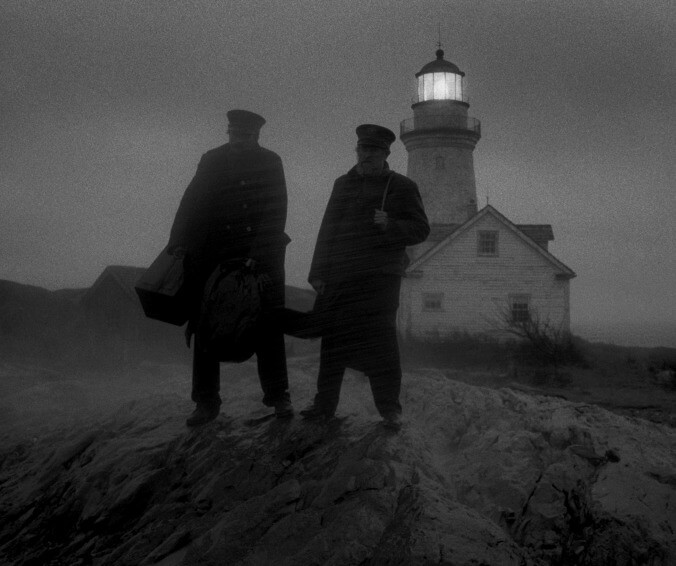The Lighthouse is an insanely inspired buddy comedy in the key of A24 horror

Robert Pattinson and Willem Dafoe have the kind of faces Norma Desmond waxed nostalgic about in Sunset Boulevard. Like all the stars of the silent era, they don’t need dialogue; a whole movie could be hung on the topography of their features, on what Pattinson does with those haunted eyes he used to fix on Kristen Stewart and how Dafoe uses that toothy goblin grin of his for mirth or menace. The Lighthouse, a monochromatic new nightmare from the writer and director of The Witch, supplies both actors with plenty of dialogue—pages upon pages of outrageous sea-shanty vernacular. But it also knows when to let those interesting faces, ornamented with spectacular tufts of hair, do the talking for them. Very early on, the filmmaker, Robert Eggers, arranges them side by side in the frame by way of introduction. Staring right into the lens, they look starved and weary and American, as though they’ve walked straight out of an early, faded photograph. Or maybe we’ve walked into one, snapped on a lonely spike of seaside rock, circa a primeval yesterday of the 1890s.
For just shy of two hours, The Lighthouse offers little more than a war of wills and words. The film is set on the dreary coast of 19th-century Maine. It’s here that a veteran lighthouse keeper, Thomas Wake (Dafoe), convenes with his new protégé, a former lumberjack named Ephraim Winslow (Pattinson), for four weeks of hard, solitary labor. Thomas, whose vocabulary is even mightier than his beard, is a tyrant of a boss when sober; he barks belittling orders and obsessively bogarts the nocturnal duty of manning the light. When drunk, which is basically every night, he’s a literal and figurative gasbag, his verbiage as pungent as his flatulence. For Ephraim, a gaunt and quiet fellow holding back a tsunami of resentment, it’s going to be a long month, spent enduring the whimsical nonsense of this old sea dog and breaking his back dragging barrels of oil up the winding steps of the phallic tower.
Hell, as they say, is other people. But does some actual unholy force, rising from deep within the drink, threaten the already fragile sanity of these lost souls? Visions of beautiful-grotesque sirens and slimy, erotic tentacles haunt Ephraim’s dreams. As in The Witch, that intense crucible of religious terror on the edge of civilization, Eggers blurs the line between madness and supernatural danger, not dismissing the latter as an illusion so much as treating it like an outgrowth of the former. The Lighthouse is another New England folktale, another homegrown period piece of isolation, flavorfully archaic language, and hungry birds. If it can be believed, this is an even less commercial venture than its multiplex-invading predecessor. Eggers shoots in a milky, foggy black-and-white and in a severely squashed 1.19:1 aspect ratio—choices that lend it a throwback classicism, while also enhancing the claustrophobia and hopelessness of the grubby, secluded setting.
There are images, of bickering by candlelight and frail figures dwarfed by an imposing beacon, that could be torn from a volume of old ghost stories, like something you’d see splashed across the cover or alternating pages of an Algernon Blackwood collection. Eggers draws, too, from theatrical influences—he’s built a two-hander of simmering animosity that might work perfectly well on a tiny stage. Start to finish, Pattinson and Dafoe are a hoot. Though both of their characters have secrets to keep, they’re also open books, broadcasting their insecurities and anxieties as clearly as a light shone over dark waters. They drink, they piss, they jerk off, they hurl exquisitely purple insults, they beat their chests like King Kong, they almost make the homoerotic subtext into text, before lurching back into panicked, overcompensating fisticuffs. “You sound like a goddamn parody,” Ephraim tells Thomas—and indeed, Dafoe seems to be trying, with awe-inspiring conviction, to make flesh the sea captain from The Simpsons. His is the showier role (a late, great monologue of hexing pleas to the sea gods should promptly join the acting-class pantheon), but it’s well balanced by Pattinson’s irritation and humiliation and bitterness.
All of this fits snugly into a contemporary renaissance of atmosphere-forward horror. Maybe too snugly: By now, the film’s brand of artisanal dread has started to feel faintly like shtick—the A24mula Eggers himself helped pioneer with his tale of doomed pioneers. Right from its opening moments, The Lighthouse goes heavy on apocalyptic ominousness: a foghorn bellowing deafeningly as a ship cuts through the murky water, spinning wheels and an infernal furnace powering the eponymous structure and its eerie, tantalizing glow. But because the film starts at a nine on the atonal unease index, there’s little room for escalation, just variation. No, The Lighthouse is more satisfying when viewed through the prism of its pitch-black humor; it’s fine as a thriller, borderline brilliant as a comedy of cabin fever and competitive machismo. Anyway, how else can one really characterize a movie that fades from a trumpet-like fart into a major-key musical cue, or that pits Pattinson—in a wiry, genius bit of slapstick—against a taunting seagull, like Poe’s raven or maybe just that stubborn gopher from Caddyshack?
Note: This is an expanded version of the review The A.V. Club ran from the Cannes Film Festival.